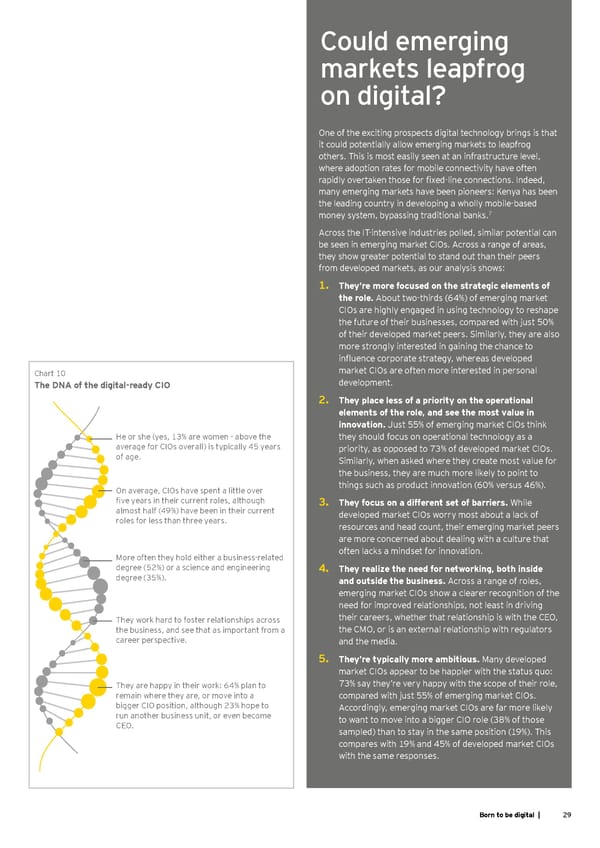Could emerging markets leapfrog on digital? One of the exciting prospects digital technology brings is that it could potentially allow emerging markets to leapfrog others. This is most easily seen at an infrastructure level, where adoption rates for mobile connectivity have often rapidly overtaken those for fixed-line connections. Indeed, many emerging markets have been pioneers: Kenya has been the leading country in developing a wholly mobile-based 7 money system, bypassing traditional banks. Across the IT-intensive industries polled, similar potential can be seen in emerging market CIOs. Across a range of areas, they show greater potential to stand out than their peers from developed markets, as our analysis shows: 1. They’re more focused on the strategic elements of the role. About two-thirds (64%) of emerging market CIOs are highly engaged in using technology to reshape the future of their businesses, compared with just 50% of their developed market peers. Similarly, they are also more strongly interested in gaining the chance to influence corporate strategy, whereas developed Chart 10 market CIOs are often more interested in personal The DNA of the digital-ready CIO development. 2. They place less of a priority on the operational elements of the role, and see the most value in innovation. Just 55% of emerging market CIOs think He or she (yes, 13% are women - above the they should focus on operational technology as a average for CIOs overall) is typically 45 years priority, as opposed to 73% of developed market CIOs. of age. Similarly, when asked where they create most value for the business, they are much more likely to point to On average, CIOs have spent a little over things such as product innovation (60% versus 46%). five years in their current roles, although 3. They focus on a different set of barriers. While almost half (49%) have been in their current developed market CIOs worry most about a lack of roles for less than three years. resources and head count, their emerging market peers are more concerned about dealing with a culture that More often they hold either a business-related often lacks a mindset for innovation. degree (52%) or a science and engineering 4. They realize the need for networking, both inside degree (35%). and outside the business. Across a range of roles, emerging market CIOs show a clearer recognition of the need for improved relationships, not least in driving They work hard to foster relationships across their careers, whether that relationship is with the CEO, the business, and see that as important from a the CMO, or is an external relationship with regulators career perspective. and the media. 5. They’re typically more ambitious. Many developed market CIOs appear to be happier with the status quo: They are happy in their work: 64% plan to 73% say they’re very happy with the scope of their role, remain where they are, or move into a compared with just 55% of emerging market CIOs. bigger CIO position, although 23% hope to Accordingly, emerging market CIOs are far more likely run another business unit, or even become to want to move into a bigger CIO role (38% of those CEO. sampled) than to stay in the same position (19%). This compares with 19% and 45% of developed market CIOs with the same responses. Born to be digital | 29
 Born to be Digital Page 33 Page 35
Born to be Digital Page 33 Page 35